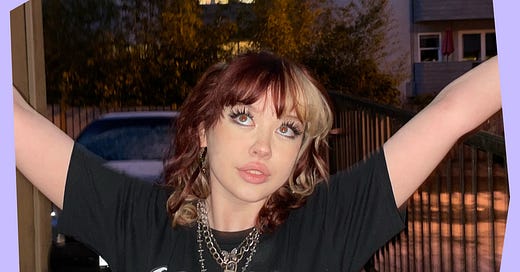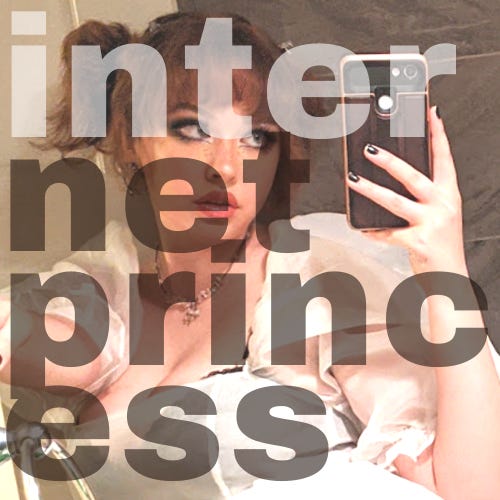This week, we interviewed Rayne Fisher-Quann, the essayist behind internet princess, a newsletter exploring what it means to be a female writer today.
This interview has been lightly edited for length and clarity.
What’s your Substack about in one sentence?
Internet Princess is a newsletter for critical feminists, manic-depressive hotties, internet-obsessed freaks, Radiohead fans, Joan Didion fans, cunts, pseudointellectuals, real intellectuals, people who want to get better, people who are determined to get worse, and everyone who feels like the online world is making them crazy.
You sometimes share a written post again as a video or audio essay. Where do your ideas start, and what’s your creative process?
My essays all start as ideas that I can’t get out of my head. I have a very conversational writing style, which is literally because a lot of my essays are taken directly from things I say out loud. I spend all day talking to myself to work through the issues I’m thinking about, sometimes acting as both sides of an argument. Usually if I find myself talking about something for long enough, it’s a sign that it’s time to write about it.
I’m very depressed and very low-energy, so when I feel a burst of inspiration, I try to take it. Typically I write my essays all at once in a stretch of three to five uninterrupted hours.
How do you see internet princess fitting into the wider newsletter topography?
My long analytical essays about feminism, mental illness, and internet culture are the hallmark of my blog, but paid subscribers love the curated content recommendations, audio essays, political and cultural discussion threads, and my advice column, Lobotomy Bait, and those have ended up being some of my favorite things to write. I have really big plans for my Substack. I think we’re in a Gen Z blogging boom, and I’m honored to be a part of it.
In the very near future, I’m starting an in-conversation series with people you should know on the internet—I release them to everybody as transcribed interviews, and they’re sometimes released in podcast form to paid subs too. Long-term, once I have a large enough subscriber base, I would love to eventually be able to pay other young writers to publish on my Substack and turn it into something like a large-scale Gen Z hub for smart, funny, cool cultural criticism.
You’ve spoken about your generation’s capacity for longform. Is part of internet princess trying to highlight this to a broader audience?
I think people in my online sphere really crave nuance and detail and are actively fighting against tech companies’ attempted hijacking of our attention spans.
There’s a lot that I’m heartened by. Women, young women especially, have always owned the online blogging world, and I hope they’re all getting more recognition now that blogging as a form is gaining mainstream attention again.
I also think people are starting to get critical of algorithmically-generated curations of what they should think, watch, and consume, and I think that can only be a good thing.
In your essay “standing on the shoulders of complex female characters,” you write about being in the “Fleabag era” of your life—notably, developing a consciousness that every experience can be packaged to be consumed. How do you ratify anxiety about the era of consumable experience with the act of sharing your personal experiences with your subscribers?
This is a great question, and one I don’t have a perfect answer to—it’s something I think about every day. I actually almost ended that essay with a self-criticism about how I had thought of all this stuff and immediately decided to package it for external consumption, but I thought that would be too meta and maybe too depressing. There are a lot of thoughts and experiences that I don’t write about, even though I know the posts would probably be popular, because I think everyone needs a part of themselves to keep just for them.
At the same time, though, I undeniably do put a lot of myself out there, and it definitely does create a lot of anxiety. It’s especially weird because my work in particular has landed me somewhere in between essayist and influencer. Some people are fans of my writing and some people are fans of me, which I think is a very scary thing. But I think talking and writing about my fear of self-commodification has made me see that it’s a fear that basically every woman has, to some extent, and that the only way through is to talk to each other about it. I view writing, and my Substack as a whole, as a very collaborative experience, and it helps me to think of my blog as something I sort of create with my audience, rather than something I just package for them to blindly consume.
I think talking and writing about my fear of self-commodification has made me see that it’s a fear that basically every woman has, to some extent, and that the only way through is to talk to each other about it.
Read more: standing on the shoulders of complex female characters
Who’s another Substack writer you’d recommend?
My friends Charlie and Kennedy both have really wonderful substacks. Charlie’s is called evil female, and Kennedy’s is Parent Newsletter. They both write funny, smart, sharp cultural criticism on the cutting edge of discourse.
Subscribe to Rayne’s newsletter, internet princess, and find her on TikTok, Twitter, and Instagram.







Share this post